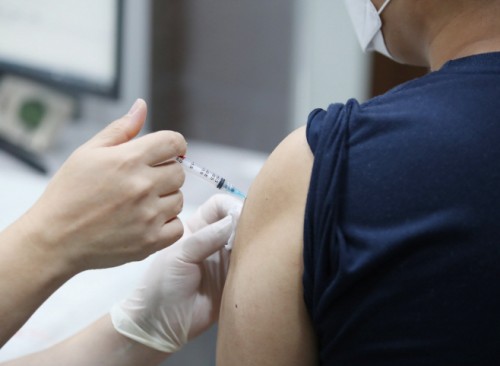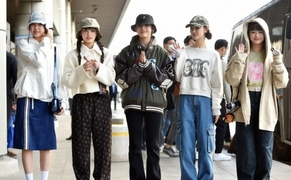 |
| A man receives a shot of Johnson & Johnson’s Janssen vaccine at a clinic in Seoul on June 10, 2021./ Source: Yonhap |
AsiaToday reporter Park Ah-ram
The number of breakthrough COVID-19 infections in South Korea is rising rapidly amid the fourth wave of pandemic, raising doubts over the effectiveness of vaccines. Health authorities and experts stressed the need for more vaccinations, saying that breakthrough infection is not an unusual phenomenon.
The Korea Disease Control and Prevention Agency (KDCA) said the country has confirmed a total of 647 breakthrough cases. The incidence rate per 100,000 inoculations is approximately 12. Although the this is merely 0.01 percent, the figure has more than doubled in 11 days.
Breakthrough infections refer to cases where people test positive for the virus at least 14 days after they have been fully vaccinated.
By vaccine, Johnson & Johnson’s Janssen had the largest number of such cases with 364, followed by Pfizer with 145 and AstraZeneca with 148. Looking at the breakthrough infection rate per 100,000 inoculations, Janssen stood at 32 while AstraZeneca stood at 14.1 and Pfizer at 4.4.
Regarding the high number of breakthrough infections among those who received Janssen vaccine, Park Young-joon, head of the epidemiological investigation team at the KDCA, said, “Currently, we do not see this as a special issue. Those who are active and meet peer groups are more likely to be infected. Young people with such characteristics have received more Janssen vaccines than other vaccines.”
This means that young men in their 30s and 40s, including reservists and civil defense members who have received Janssen vaccines, are more likely to be exposed to the virus than other age groups since they are more active than other age groups and their peers have a higher vaccination rate.
However, experts emphasize that vaccination is the most important thing, saying that breakthrough patients have a low risk of degenerating into serious conditions. “Breakthrough infection is a natural phenomenon that occurs with any vaccines,” said Chun Eun-mi, a respiratory disease specialist at Ewha Womans University Medical Center in Seoul. “Vaccination is effective in preventing serious diseases and lowering mortality, therefore it is still effective in terms of protective effect,” Chun said.
As of July 19, health authorities said 4 out of the 647 breakthrough infection cases are categorized as serious, and none have so far been fatal.
As of Wednesday midnight, 139,214 people had been newly inoculated and a total of 16.58 million people, or 32 percent of the nation’s total population, had received their first dose. The daily number of those fully vaccinated rose by 23,593 to reach 6.72 million people, or 13.1 percent of the population.
#breakthrough infections #COVID-19 #South Korea
Copyright by Asiatoday
Most Read
-
1
-
2
-
3
-
4
-
5
-
6
-
7





















